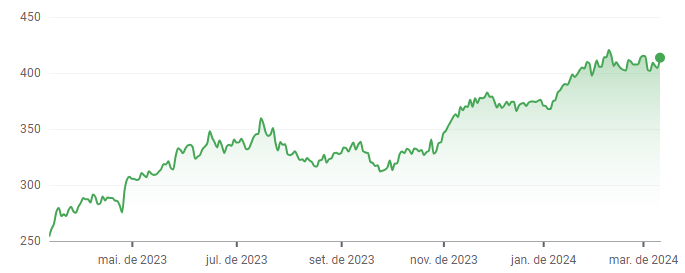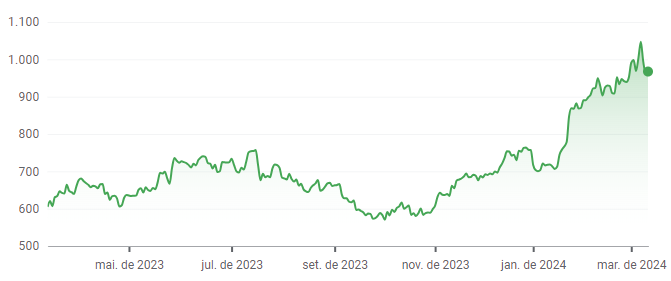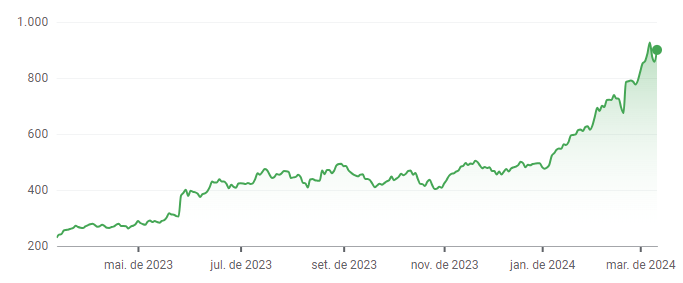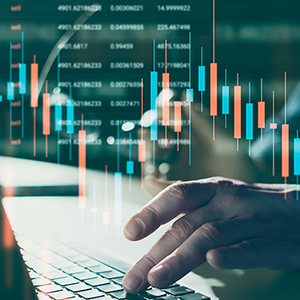- The Bank
- People
- All Services
- Private Banking
- Savings and Investment
- GoBulling Platforms
- Institutional and Corporate
- Insights
- Login My.BancoCarregosa
- Contacts
Enter your Username to gain access to your Bank. Complete your authentication on the next screen.
If you are not yet a client, open your account here or contact us for more information
Artificial intelligence: impact and investment opportunities


Discover how artificial intelligence is changing the way we invest and how it can help diversify portfolios.
Artificial intelligence is increasingly in the spotlight, with implications for almost every aspect of our lives. But what are its benefits and risks? And how can it be used in the investment world? We’ll explore these questions in this article.
What is artificial intelligence?
Artificial intelligence (AI) refers to the ability of systems to perform tasks that normally require human intelligence – such as learning, problem solving, understanding natural language and code, recognising patterns, and making decisions. AI uses advanced algorithms and mathematical models to analyse large amounts of data, identify trends and predict outcomes, automating and improving complex processes.
Origin and historical development
Artificial intelligence originated in the 1950s, but it is only recently that we have seen a real explosion in its development and application. This is largely due to advances in computing technology and the exponential growth of available data.
• 1950. Alan Turing publishes the article "Computing Machinery and Intelligence”, introducing the famous "Turing Test”, which determines the ability of a system to replicate human intelligence.
• 1956. John McCarthy first coined the term "artificial intelligence” and organised the Dartmouth Conference, marking the official start of AI research as a discipline.
• 1960. Joseph Weizenbaum creates the ELIZA programme, one of the first natural language processing systems.
• 1969. Marvin Minsky and Seymour Papert publish "Perceptrons”, a reference book on the limitations of neural networks.
• 1980. Funding for AI declines due to unreasonable expectations and lack of practical progress.
• 1987. The book "Perceptrons” is reviewed, paving the way for the revival of neural networks.
• 1997. IBM develops Deep Blue, which defeats world chess champion Garry Kasparov.
• 2011. IBM follows the success of Deep Blue with Watson, which wins the TV game show Jeopardy, demonstrating its natural language processing capabilities.
• 2012. There is a boom in virtual assistants that use AI to interpret natural language (Siri, Google Now, Cortana, Alexa).
• 2016. The emergence of OpenAI and DeepMind AlphaGo initiative, which beats the world champion at Go, marking a significant milestone in complex games.
• 2017. Google researchers publish "Attention is all you need”, introducing the concept of transformation models and major advances in "Generative AI” models.
• 2020. ChatGPT3 produces speech in a similar way to a human. AI is gradually being integrated into various industries, covering sectors such as health, finance and automation.
• 2024. To ensure responsible and transparent use, AI ethics and regulations are constantly evolving.
Artificial intelligence: opportunities and risks
Like any technology, artificial intelligence has its pros and cons. The ability to analyse large amounts of data quickly and accurately can provide valuable insights for investors, helping them make informed decisions. It is also used to optimise trading strategies by identifying complex patterns in financial markets. Specifically, these systems can analyse the history of various assets, identify complex patterns and provide valuable insights on which to base investment decisions.
However, while AI is designed to minimise human error, the reality is that it can inherit prejudices and biases present in the data it analyses and come to conclusions that are also biased. In fact, models are highly dependent on the data on which they are trained. In addition, there is a risk of "hallucination” (inappropriate responses to the purpose of the task being asked of the model), which can negatively affect the performance of models. A recent example of this phenomenon is Google’s failure with its Gemini model, which was trained on patterns of social inclusion but produced responses that were contrary to its purpose. In other words, the model’s responses were actually offensive, and Goodle’s own CEO described these errors as unacceptable.
It is also important to make a distinction between traditional AI and generative AI. The latest revolution is in the field of generative AI. The distinctions between the two types are beyond the scope of this article, but the important thing to note is the difference in "creativity” between the two. The results of generative AI are broader, allowing different tasks to be adapted to a model. The results of traditional AI are tailored to the tasks for which the models have been trained, but they are not creative in their results. In other words, they are trained to find relationships between parameters to predict the data that more traditional models are unable to do.
In practice, while the former is currently suitable for decision support by aggregating and synthesising large amounts of information for analysts, it will not be suitable for financial forecasting due to the risk of hallucination in the final answer.
In the future, the combination of the two types of AI will reap the benefits of the technology, but today this barrier is still visible.
This distinction is important because, just as companies were valued on the stock market during the 1999-2000 bubble simply by adding ".com” to their name, AI is creating room for opportunistic behaviour based on false promises. AI models for financial forecasting have been around since the 1990s. Several companies can simply sell the same product and call it innovative, when in fact it doesn’t offer anything new.
We try to make this distinction at Banco Carregosa. It is important to understand which companies have the potential to realise the potential of this technology in their business models.
How to invest in artificial intelligence
One of the most direct ways to invest in AI is through the leading companies in the sector, such as Microsoft, Alphabet, Meta and Apple. For example, Microsoft – one of the early investors in OpenAI, the company behind ChatGPT – recently announced CoPilot, an upgrade to Microsoft Office products (Word, Excel, etc.) to include built-in AI tools. As a result of its continued focus on AI, Microsoft’s stock has appreciated more than 55% in the last year and nearly 300% in the last 5 years.
Microsoft share price (MSFT)

Alphabet (owner of Google) and Meta (parent company of Facebook, Instagram and WhatsApp) are also investing heavily to make AI a reality for millions of users and to introduce AI solutions into everyday products. Google has already launched its alternative to ChatGPT, Gemini, and according to some reports, Meta's annual budget for AI development is around $33 billion (roughly the GDP of Iceland).
But these are not the only tech giants benefiting from the AI boom. While they may not be as well known to the general public, there are a number of other companies that are just as vital to the development of AI and are reaping significant benefits. Take, for example, what is happening in the world of chip manufacturing, where processors are essential for processing all the basic information for AI language models. One of Europe’s most valuable companies, ASML, is active in this sector. The Dutch company makes the only machines capable of producing the world’s most advanced (and smallest) chips.
ASML share price

Thanks to its exclusive lithography technology, it is chosen by the world’s largest chip manufacturers – such as Samsung, TSMC (Taiwan Semiconductor Manufacturing Company) and NVIDIA – companies that are fundamental to the current AI ecosystem and highly relevant to investors. In the last 12 months alone, NVIDIA, a company that used to make graphics cards and now makes cutting-edge chips, has appreciated 231%.
NVIDIA share price

AI continues to grow globally. Global private investment reached $18 billion in the first quarter of 2023, bringing the total market value of the sector to over $100 billion.
Banco Carregosa, where artificial intelligence helps diversify investment portfolios
If you’re looking to diversify your investment portfolio with the opportunities offered by artificial intelligence, seek specialised advice from our financial advisors. You can trade stocks and ETFs that give you exposure to Ai through the GoBulling Pro trading platform. Another way of investing in this sector is through investment funds, where Banco Carregosa offers a wide range of products.
Contact us to benefit from our experience and make the most of the latest trends in the investment world.



















